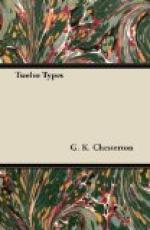But if in any case it should happen that a class or a generation lose the sense of the peculiar kind of joy which is being celebrated, they immediately begin to call the enjoyers of that joy gloomy and self-destroying. The most formidable liberal philosophers have called the monks melancholy because they denied themselves the pleasures of liberty and marriage. They might as well call the trippers on a Bank Holiday melancholy because they deny themselves, as a rule, the pleasures of silence and meditation. A simpler and stronger example is, however, to hand. If ever it should happen that the system of English athletics should vanish from the public schools and the universities, if science should supply some new and non-competitive manner of perfecting the physique, if public ethics swung round to an attitude of absolute contempt and indifference towards the feeling called sport, then it is easy to see what would happen. Future historians would simply state that in the dark days of Queen Victoria young men at Oxford and Cambridge were subjected to a horrible sort of religious torture. They were forbidden, by fantastic monastic rules, to indulge in wine or tobacco during certain arbitrarily fixed periods of time, before certain brutal fights and festivals. Bigots insisted on their rising at unearthly hours and running violently around fields for no object. Many men ruined their health in these dens of superstition, many died there. All this is perfectly true and irrefutable. Athleticism in England is an asceticism, as much as the monastic rules. Men have over-strained themselves and killed themselves through English athleticism. There is one difference and one only: we do feel the love of sport; we do not feel the love of religious offices. We see only the price in the one case and only the purchase in the other.
The only question that remains is what was the joy of the old Christian ascetics of which their ascetism was merely the purchasing price. The mere possibility of the query is an extraordinary example of the way in which we miss the main points of human history. We are looking at humanity too close, and see only the details and not the vast and dominant features. We look at the rise of Christianity, and conceive it as a rise of self-abnegation and almost of pessimism. It does not occur to us that the mere assertion that this raging and confounding universe is governed by justice and mercy is a piece of staggering optimism fit to set all men capering. The detail over which these monks went mad with joy was the universe itself; the only thing really worthy of enjoyment. The white daylight shone over all the world, the endless forests stood up in their order. The lightning awoke and the tree fell and the sea gathered into mountains and the ship went down, and all these disconnected and meaningless and terrible objects were all part of one dark and fearful conspiracy of goodness, one merciless scheme of mercy. That this scheme of




